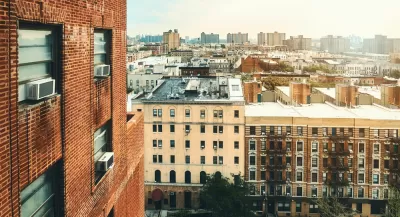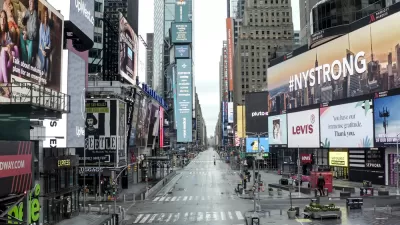For the first time in at least three decades, major metropolitan areas in the U.S. showed negative population growth during the peak of the COVID-19 pandemic.

Data from the U.S. Census Bureau shows a strong trend toward outmigration from big cities between July 2020 and July 2021, when the pandemic was at its peak. According to a piece by William H. Frey, “These shifts occurred during a year in which the nation registered its lowest population growth (0.1%) in at least 120 years, due to sharply reduced immigration from abroad and much lower levels of natural increase (the excess of births over deaths).”
The pandemic accelerated existing trends, Frey writes, pointing to more restrictive immigration laws and a decline in childbirths for many groups as factors for lower population growth nationwide. “The onset of the pandemic-accelerated growth slowdown in major metro areas led to an absolute population loss in 2020-21 among those areas combined. This is the first time the nation’s major metro areas registered an annual negative growth rate since at least 1990.”
The article expresses optimism that pandemic-era trends will reverse and population growth will return to a healthier growth rate. But it remains to be seen how the change in commuting patterns and the amenities people prioritize will impact the growth of large cities, and whether the recent popularity of small towns and suburbs with younger households will lead to a shift in the suburban form and more sustainable suburban planning.
FULL STORY: New census data shows a huge spike in movement out of big metro areas during the pandemic

Alabama: Trump Terminates Settlements for Black Communities Harmed By Raw Sewage
Trump deemed the landmark civil rights agreement “illegal DEI and environmental justice policy.”

Study: Maui’s Plan to Convert Vacation Rentals to Long-Term Housing Could Cause Nearly $1 Billion Economic Loss
The plan would reduce visitor accommodation by 25% resulting in 1,900 jobs lost.

Planetizen Federal Action Tracker
A weekly monitor of how Trump’s orders and actions are impacting planners and planning in America.

Milwaukee to Double Bike Share Stations
Bublr Bikes, one of the nation’s most successful, will add 500 new e-bikes to its system.

DC Extends Application Window for Outdoor Dining Permits
District restaurants will have until the end of November to apply, but businesses with permits in rush hour parking lanes must end operations on July 31.

Wind Energy on the Rise Despite Federal Policy Reversal
The Trump administration is revoking federal support for renewable energy, but demand for new projects continues unabated.
Urban Design for Planners 1: Software Tools
This six-course series explores essential urban design concepts using open source software and equips planners with the tools they need to participate fully in the urban design process.
Planning for Universal Design
Learn the tools for implementing Universal Design in planning regulations.
Caltrans
Smith Gee Studio
Institute for Housing and Urban Development Studies (IHS)
City of Grandview
Harvard GSD Executive Education
Toledo-Lucas County Plan Commissions
Salt Lake City
NYU Wagner Graduate School of Public Service





























